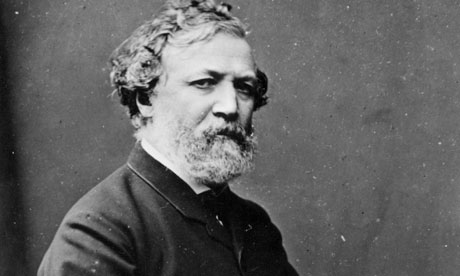
It's Robert Browning's misfortune to be more often remembered as material for jokes or as the victim of humiliation than as the author of Men and Women, Dramatis Personae and The Ring and the Book. There's Oscar Wilde's gag that "Meredith was a prose Browning, and so was Browning". Or Jane Carlyle's uncertainty, after having read the lengthy, obscure narrative poem Sordello, as to whether Sordello was "a man, a city, or a book".
Has any other leading author been so regular an object of mockery? Even Henry James could not resist it, reporting after a reading by the poet that it was comforting that "if you don't understand [his poems], he himself apparently understands them even less". Max Beerbohm sent him up in a story and a cartoon, the first about a mutually uncomprehending encounter with Ibsen, the second showing him uncomfortable amid his worshippers, a prisoner of the Browningites.
Punch lampooned him as inescapably a Victorian gentleman, but living out a fantasy of being Italian. In Flush, Virginia Woolf's biography of the dog that belonged to his wife, Elizabeth Barrett Browning, his most memorable appearance involves being bitten by the protagonist. This tradition may partly explain why the bicentenary of Browning's birth, which falls on 7 May, is being marked in so muted a fashion – even a ceremony honouring him at Westminster Abbey's Poets' Corner is not taking place until December, as if fans are sulking at the extent to which his big year has been overshadowed by the Charles Dickens celebrations that began last autumn and are still continuing.
Yet there ought to be much to celebrate. He may be best-known now for "The Pied Piper of Hamelin", but the legacy of the dramatic monologue runs (via Eliot, Pound, Frost, Plath, Hughes and others) to Carol Ann Duffy in poetry, and all the way to the use of personas by rappers such as Eminem and Nicki Minaj in music.
Almost all those jokes and send-ups came from Browning admirers, and testify (as parody often does) to his eminence. Wilde's remark may have originated as a snarky one-liner, but when deployed at the end of his essay on Browning its effect is very different – far from ridiculing either him or Meredith, he is applauding both.
"Taken as a whole the man was great," Wilde begins, and he concludes – after recalling figures from the poems – by declaring that as "a creator of character he ranks next to him who made Hamlet". He should be seen, not as a poet, but as "the most supreme writer of fiction, it may be, that we have ever had".

